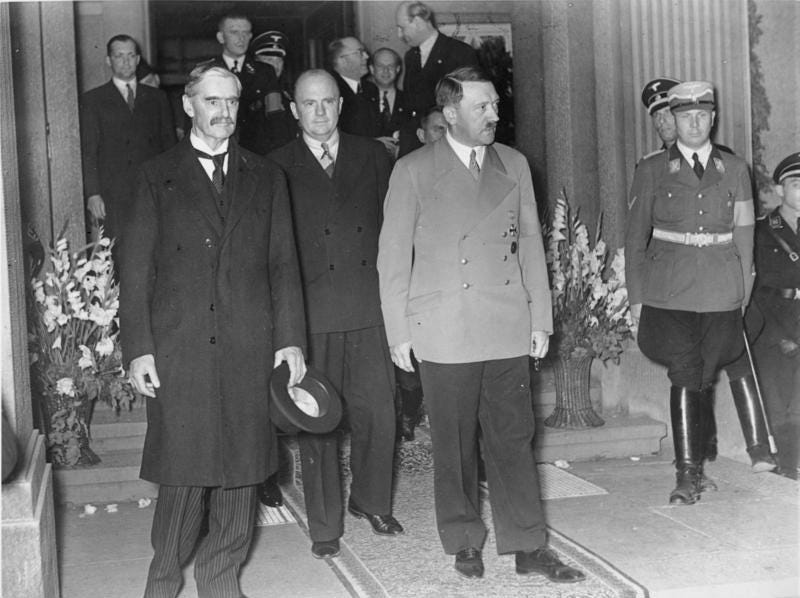
[Adolf Hitler] “would not deliberately deceive a man whom he respected, and with whom he had been in negotiation [and it would be] a great tragedy if we lost this opportunity of reaching an understanding with Germany.” —Neville Chamberlain, September 24, 1938
Prime Minister of the United Kingdom (May 28, 1937 – May 10, 1940)1
“Our enemies are small worms. I saw them in Munich.” —Adolf Hitler, August, 1939.2
Chancellor of Germany (January 30, 1933 - April 30, 1945)
“We shall go on and we shall fight it out, here or elsewhere and if this long island story of ours is to end at last, let it end only when each of us lies choking in his own blood upon the ground.” —Winston Churchill, May 28, 1940
Prime Minister of the United Kingdom (May 10, 1940 – July 26, 1945 and October 26, 1951- April 5, 1955)3
“Appeasement” was for centuries a value-neutral word. It meant “compromise” or “accommodation.” The meaning of the word was forever transformed on September 30, 1938. On that date, Britain and France acceded to the demands of Adolf Hitler that the Sudetenland be taken from Czechoslovakia and absorbed into Hitler’s Third Reich. No member of the Czechoslovak government was present at this meeting. That nation’s officials were informed that it was a fait accompli that their homeland was to be carved up and served to Hitler on a platter.
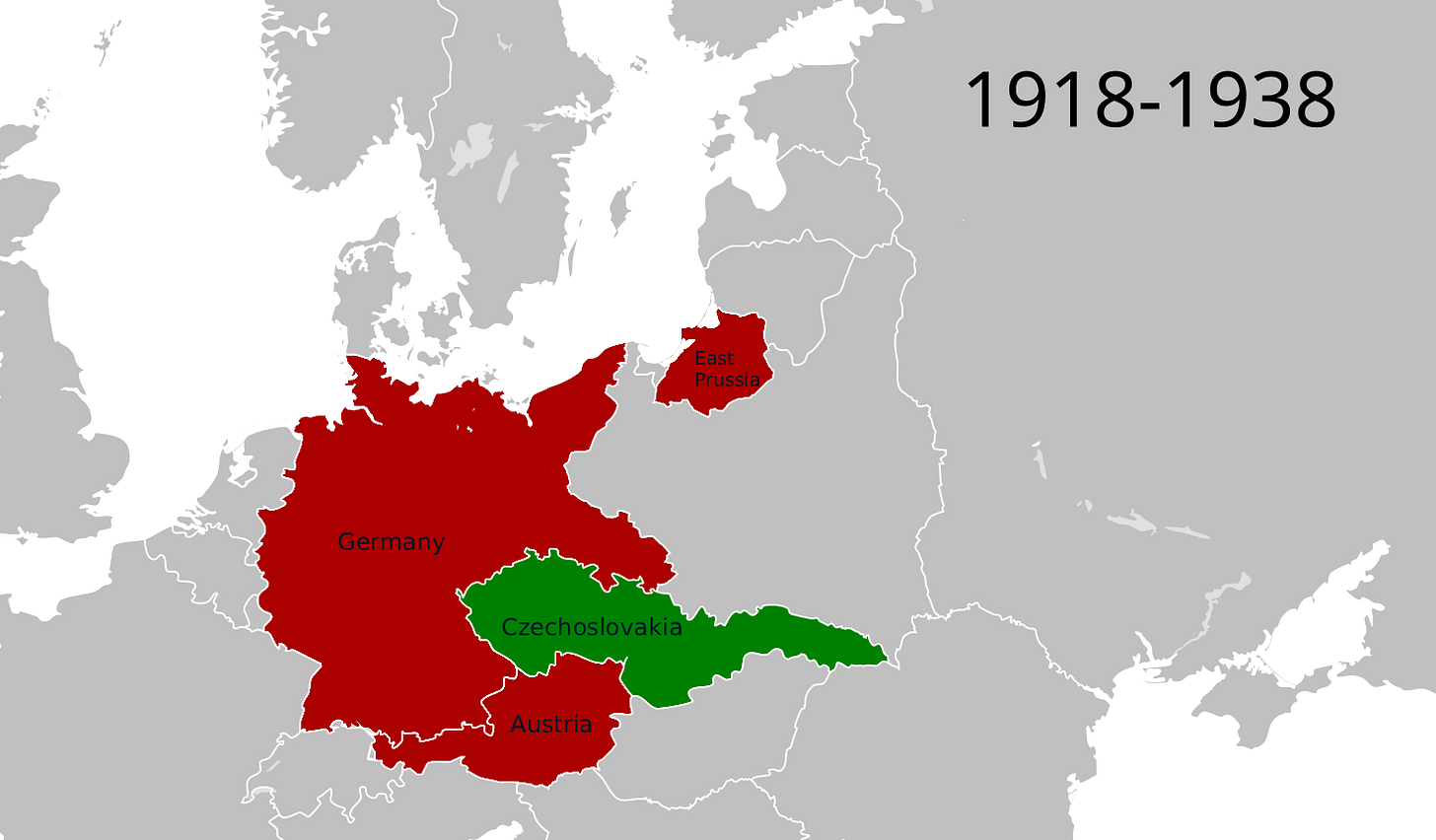
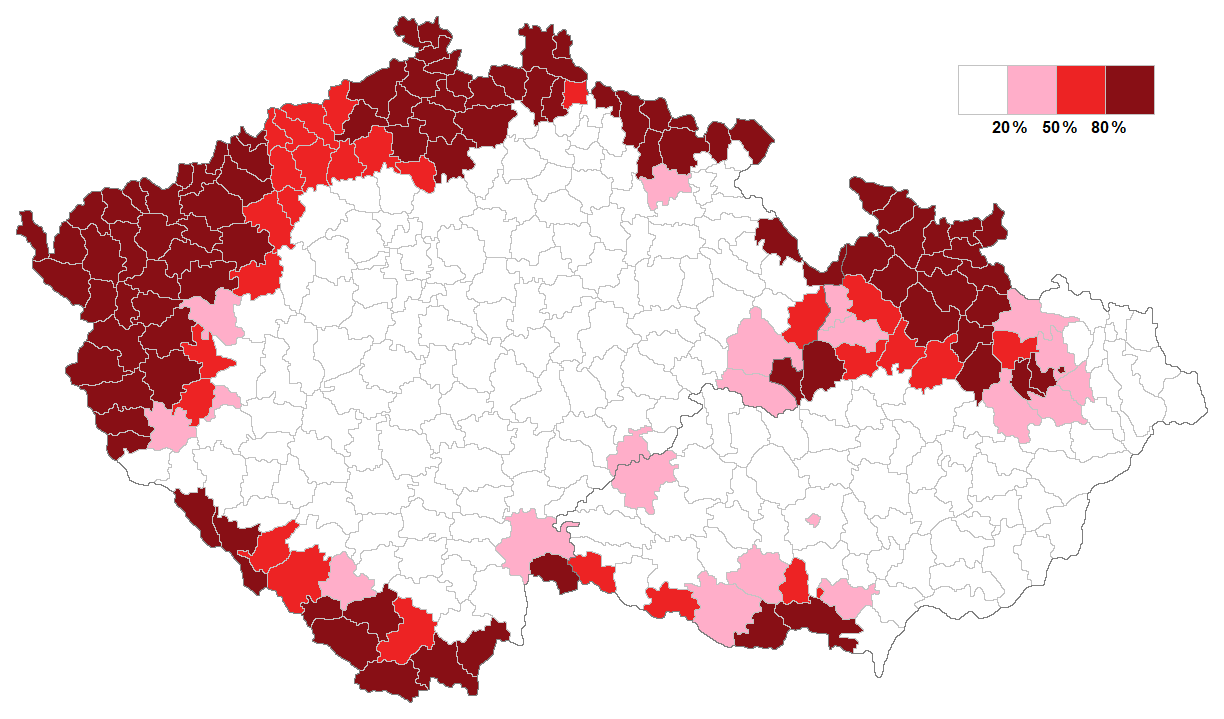
Munich was the apotheosis of Chamberlain’s policy of appeasement (with which the French concurred). The agreement reached at that time in that place was a great betrayal. It was worse than a crime. It was a mistake. That is why the word appeasement is a sinister one to this day.
Chamberlain believed that all that was required to deal with Hitler was “a practical and business-like discussion of [German] wishes. If we could bring the Germans to a negotiating table and, with pencil in hand, run through all their complaints, claims and wishes, this would greatly help clear the air or at least clarify the current situation.”4 Chamberlain saw Hitler as “a man who could be relied upon when he had given his word.”5 He was convinced that the Sudetenland would be Hitler’s last territorial demand in Europe.
There was plenty of evidence that Chamberlain’s view of Hitler was diametrically opposed to reality. Winston Churchill and others for years had been warning the United Kingdom that Hitler was a thuggish war monger. Anyone who read Hitler’s Mein Kampf could see that he was a savage. In December of 1937, a widely read book entitled The House that Hitler Built made a compelling case that “Hitlerism cannot achieve its aims without war.” Chamberlain read this book and observed, “If I accepted the author’s conclusions I should despair, but I don’t and won’t.”6 Chamberlain’s approach to Hitler was likened to “scratching a crocodile’s head in the hope of making it purr.”7
Chamberlain returned from Munich to London, landing at 5:30 in the afternoon of September 30, 1938. He was celebrated as a hero of peace. He appeared on the balcony of Buckingham Palace with his wife and with the King and Queen. (He was the first commoner ever to appear on that balcony.) He was met with wildly cheering crowds as the man who had saved the peace of Europe and of the world. At 7:27 that evening, he spoke from a first floor window at 10 Downing Street. He had returned from Germany having achieved “peace with honor. I believe it is peace for our time.”8 Of the same agreement that Chamberlain was so proud, Hitler said “That piece of paper is of no significance whatever.”9
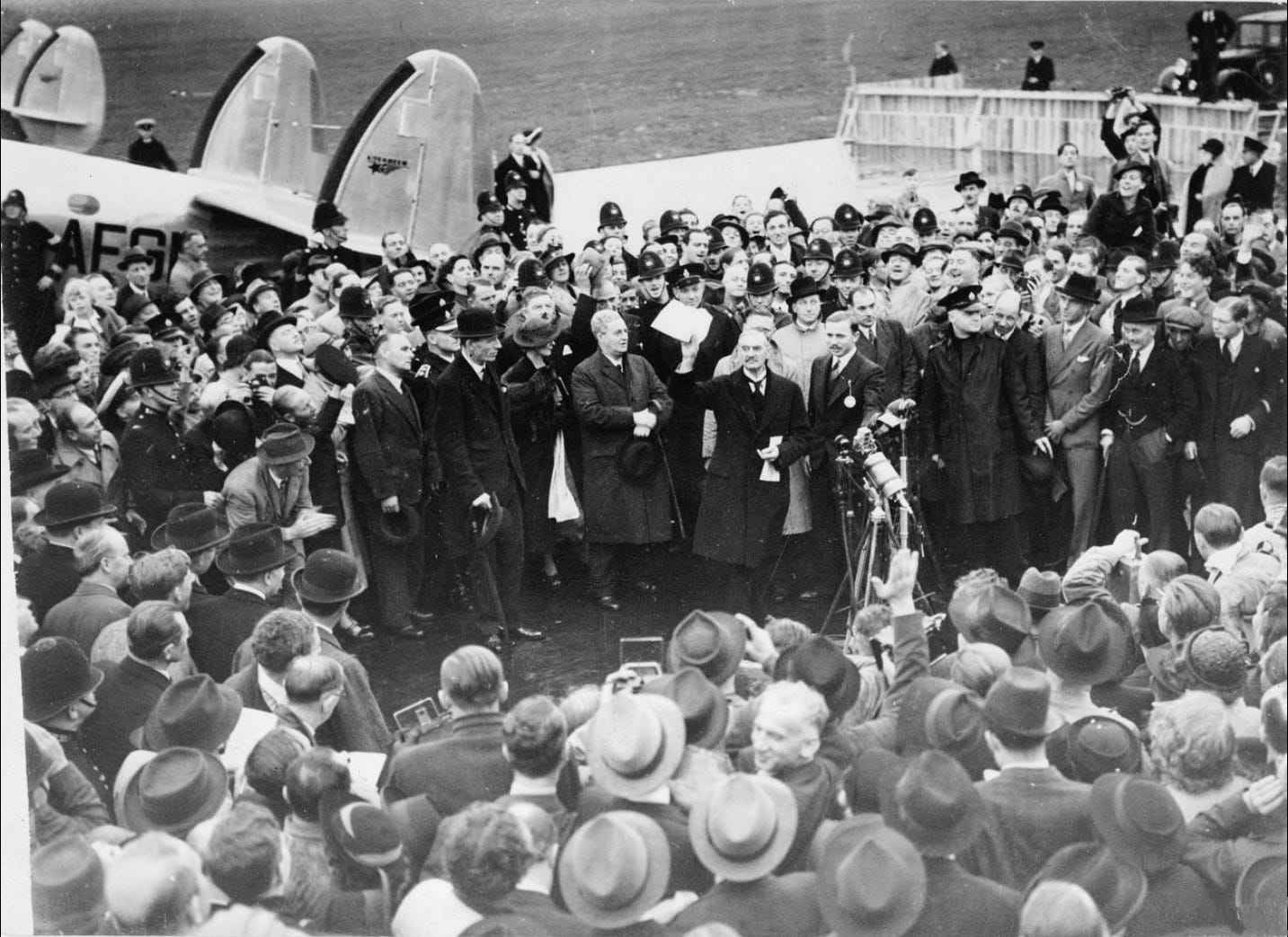
On March 12, 1939, Chamberlain said:
“I know that I can save this country and I do not believe that anyone else can.”10
On March 15, Hitler broke his word and invaded the rest of Czechoslovakia. World War II began on September 1 when Hitler invaded Poland.
His appeasement policy a failure and World War II going badly, Chamberlain was still the Prime Minister during a critical debate in the House of Commons on May 8 and 9, 1940. The climax of this debate came when Leo Amery, a member of Chamberlain’s Conservative Party, rose to speak. Amery had received his seat in the House of Commons thanks to Chamberlain’s effort, and Chamberlain was the godfather of one of his sons.11 Amery said he was speaking reluctantly because of his relationship to “old friends and associates.” But it was a moment that called for unvarnished truth. “This is what Cromwell said to the Long Parliament when he thought it was no longer fit to conduct the affairs of the nation: ‘You have sat too long here for any good you have been doing. Depart, I say, and let us have done with you. In the name of God, go!’”12 Chamberlain’s Parliamentary private secretary later recalled this as “a dagger in the heart.”13
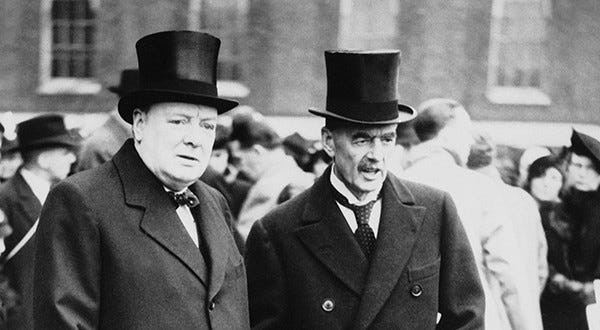
Winston Churchill became Prime Minister on May 10. And it is of him, not of Chamberlain, that it could rightly be said that he could save the country and no one else could.
On November 9, 1940, Neville Chamberlain died of cancer. Soon thereafter, Churchill eulogized him in the House of Commons. He said that it was Chamberlain’s fate in the maelstrom of an existential crisis:
“to be contradicted by events, to be disappointed in his hopes, and to be deceived and cheated by a wicked man. But what were these hopes in which he was disappointed? What were these wishes in which he was frustrated? What was that faith that was abused? They were truly among the most noble and benevolent instincts of the human heart – the love of peace, the toil for peace, the strife for peace, the pursuit of peace, even at great peril and certainly to the utter disdain of popularity or clamor.”14
The history of appeasement has never been more important than it is right now. In 1852, Karl Marx wrote: “Hegel remarks somewhere that all great world-historic facts and personages appear, so to speak, twice. He forgot to add: the first time as tragedy, the second time as farce.”15 Chamberlain’s biography is a tragedy. With Trump, we have the farce.
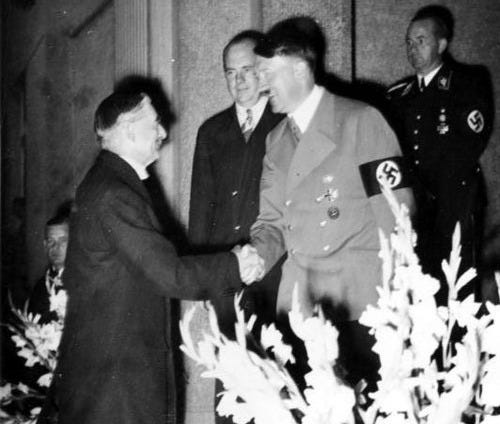
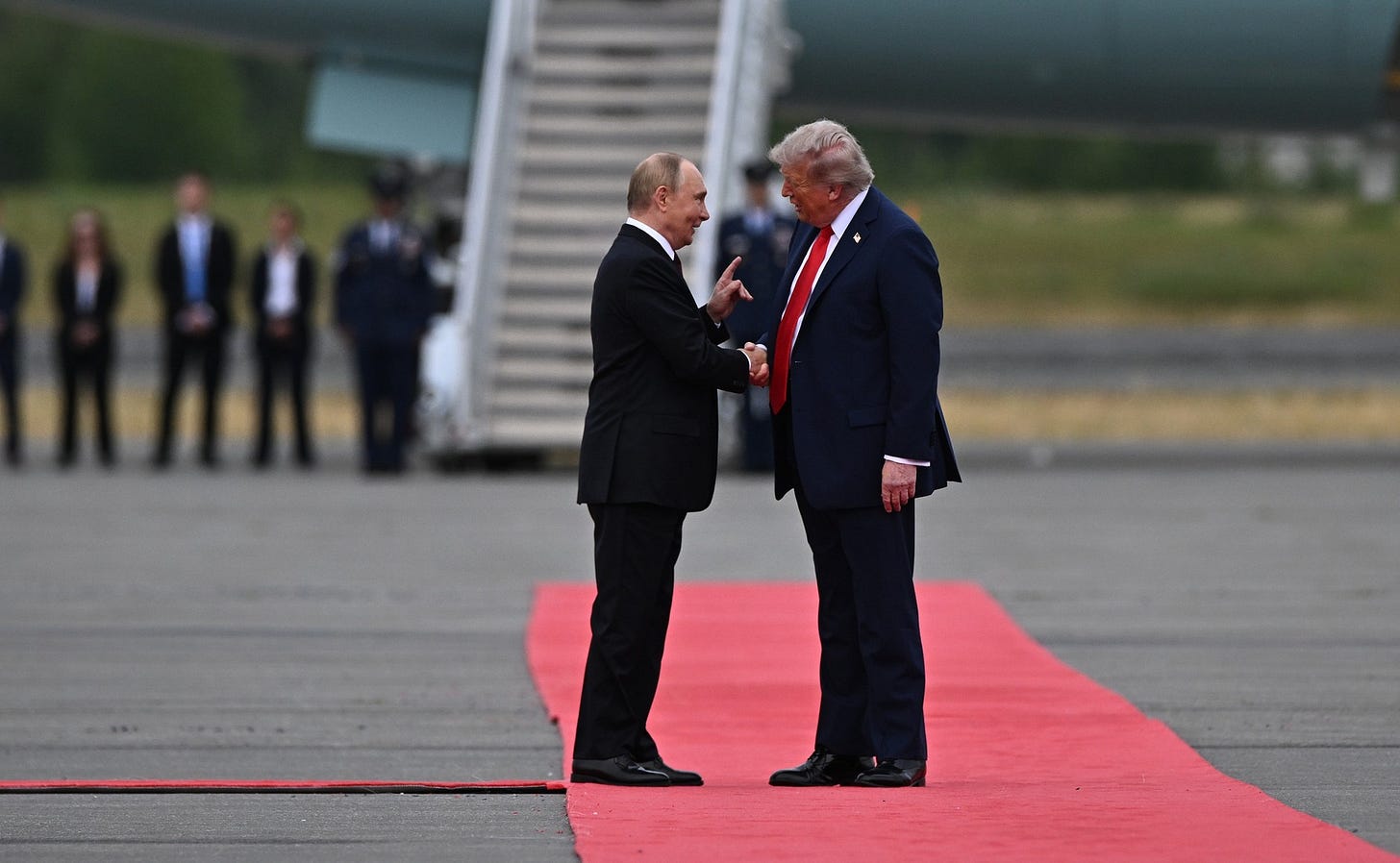
On August 15, Trump welcomed a murderous tyrant named Vladimir Putin to American soil. The purpose was to discuss the future of Ukraine, which Russia had invaded. Trump welcomed the tyrant standing at the end of a red carpet which he had rolled out. (There was a red carpet at Munich as well.) He greeted Vlad by clapping his hands like a trained seal. Just as happened at Munich in 1938, the fate of Ukraine was being discussed with no Ukrainian present. Putin got a photo op out of this event. Trump, who styles himself a negotiator, got nothing. He stroked the head of this crocodile. It did not purr.
During his campaign, Trump promised at least 53 times16 to end the war in Ukraine on his first day back in the White House. We are now 218 days into Trump’s second term, and the war goes on. Trump’s campaign promise was just another of the endless lies he tells and for which, up to now, he pays no price.
With the exception of Trump and his lickspittles, everyone knows that the lesson of Munich is that a tyrant like Putin will never be satisfied. The same is true for American citizens when dealing with a tyrant like Trump. Numerous American institutions have caved to Trump’s thuggery. Law firms, corporations, universities. Do these institutions really believe that the crocodile which is Trump will purr because they scratch his orange head?
Columbia and Brown are among the universities that have given in to Trump. Do they really think he has finished with them?
Trump is doing his best to destroy Harvard. No one knows what the outcome of his effort will be. Our nation is desperate for leadership. Will Harvard provide it?
Tim Bouverie, Appeasement (New York: Penguin Random House, 2025) p. 264.
Ian Kershaw, Hitler: 1889 – 1936 Hubris (New York: Norton, 1998) Loc. 3177.
Bouverie, Appeasement, pp. 407- 408.
Bouverie, Appeasement, p. 132.
Bouverie, Appeasement, p. 251.
Bouverie, Appeasement, p. 173.
Bouverie, Appeasement, p. 219.
Bouverie, Appeasement, p. 287.
Bouverie, Appeasement, p. 285.
Bouverie, Appeasement, p. 321.
Bouverie, Appeasement, p. 398, n. 4.
Bouverie, Appeasement, p. 398.
Bouverie, Appeasement, p. 399.
Martin Gilbert, Churchill (New York: Henry Holt, 1991) p. 683.
Karl Marx, The Eighteenth Brumaire of Louis Bonaparte https://www.marxists.org/archive/marx/works/1852/18th-brumaire/ch01.htm
https://www.cnn.com/2025/04/25/politics/fact-check-trump-ukraine-war


